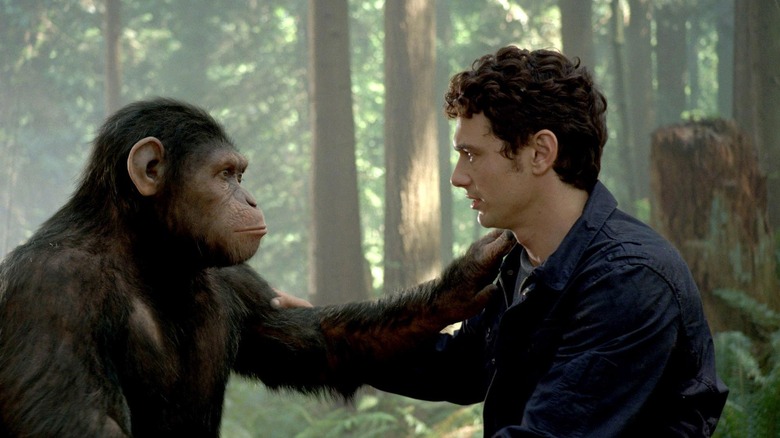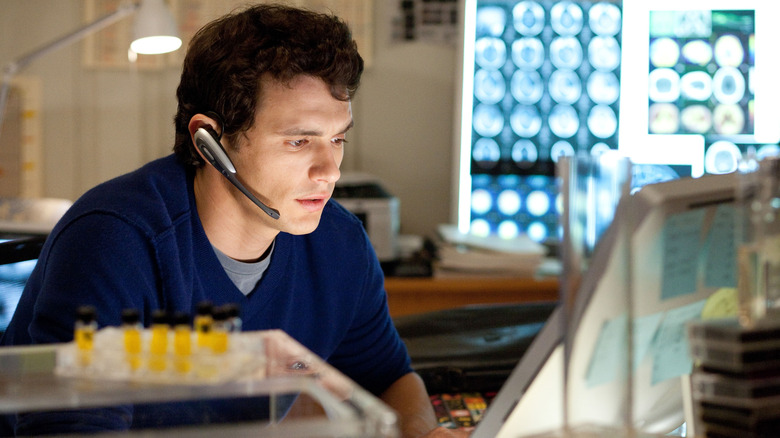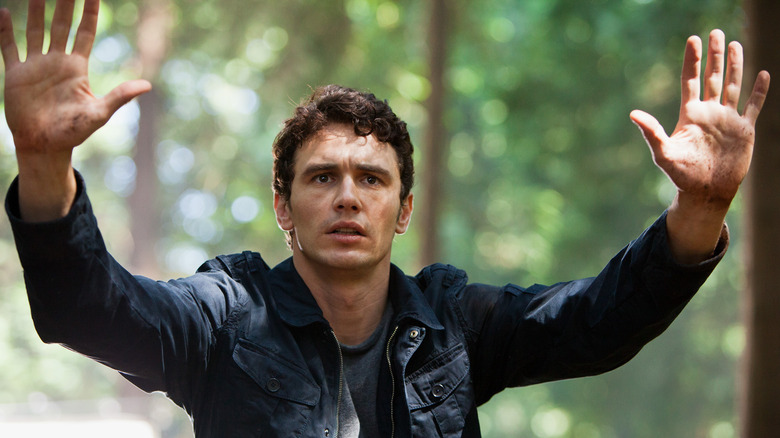What Happened To Will Rodman In Planet Of The Apes? An Investigation
You just can't keep those damn dirty apes down. 10 years after Tim Burton's 2001 "Planet of the Apes" re-imagining failed to reignite audiences' passion for stories about intellectually-enhanced simians, the long-running sci-fi franchise made an unexpectedly strong comeback with "Rise of the Planet of the Apes." Director Rupert Wyatt's entry in the series is now generally considered the weakest of the modern "Apes" trilogy, which is more of a testament to what Matt Reeves was able to accomplish with his subsequent sequels than necessarily a knock against Wyatt's film. "Rise" itself makes for an effective cautionary tale about humanity's hubris, our lack of compassion toward other living beings, and our habit of being our own worst enemy, as seen through the eyes of its co-protagonist, Caesar (Andy Serkis in his touchstone motion-capture role).
Yes, it's easy to forget that Caesar wasn't originally the singular lead of his own story. Where the humans in Reeves' movies function as either deuteragonists or antagonists, the first half of "Rise" centers on James Franco's Dr. William "Will" Rodman and his quest to engineer a drug for treating Alzheimer's disease as much as the young Caesar's coming of age under the care of Will and Will's father Charles (John Lithgow). The latter's deteriorating health, combined with Caesar's increased intellectual capacity after being exposed to the viral-based drug ALZ-112, inspires Will to take reckless action in the lab, much to the approval of his boss Steven Jacobs (an appropriately slimy David Oyelowo), who only has dollar signs in his eyes. That this all blows up in their faces makes "Rise" a classic tragedy about how good intentions aren't enough to justify ill-considered behavior (that, and that capitalism will be our downfall).
But what even happened to Will after the events of "Rise of the Planet of the Apes?" Here's what we know.
Where there's a Will, there's (not) a way
Gather around, children, and let us speak of ancient times, back when James Franco was a veritable movie star with hits like Sam Raimi's "Spider-Man" trilogy, "Pineapple Express," and "Rise of the Planet of the Apes" to his name. The actor's name is now mud thanks to the numerous allegations of sexual misconduct levied against him, but that wasn't the case when production began on the 2014 sequel to "Rise," titled "Dawn of the Planet of the Apes." Even back then, however, the idea was that Will and his girlfriend, Freida Pinto's kindly veterinarian Caroline Aranha from "Rise," had died between films.
Speaking with Collider in 2014, series producer Dylan Clark explained that the pair were "ground zero" for ALZ-113, the more powerful and gaseous version of ALZ-112 that was developed by Will yet proved to be deadly to humans and ended up causing an apocalyptic pandemic. Clark also confirmed previous reports that an alternate ending to "Rise" where Will is killed saving Caesar was shot and then discarded. In his own words:
"Yeah, it did, and it's not really a story. The truth is, we didn't go with it not because it was a bummer ending. It was actually the right thing. When we developed the script it was Dr. Frankenstein — he must be punished for his involvement. He's culpable in this whole thing. So it seemed narratively correct."
The way Clark told it, everyone involved agreed the "staging" of Will's death was poorly handled and that the theatrical ending provided a better payoff to Caesar's arc in the movie. So far as the creatives behind the "Apes" trilogy are concerned, though, it seems that Will was among the countless human victims of the manmade virus that he himself created with his bare hands.
A good man
Producers be damned, you know the rule: If there's not a body, then they're not dead. Greg Keyes' 2014 prequel novel, "Dawn of the Planet of the Apes: Firestorm," reveals that Caesar never actually found out what happened to Will and Caroline after their parting at the end of "Rise," so there's the slightest of chances that they're still alive by the time "Dawn" and maybe even the trilogy finale, "War for the Planet of the Apes," take place. Of course, that also begs the question of whether Will and Caroline being killed by the so-called Simian Flu early on would actually be a kinder fate than surviving long enough to watch the remnants of humanity tear themselves apart as the virus continues to mutate and change them in unexpected, horrifying ways.
Clark has a point about Will deserving his comeuppance to some extent, but it's worth remembering that his mistakes weren't inspired by greed like his boss's, nor were they done out of malice towards Caesar and his fellow apes. He's not strictly a figure in the Frankenstein mold, either, being motivated more by a desire to postpone the inevitable happening to his father than a sense of ego. In the only reference we get to Will in "Dawn," when Caesar finds an old video of the character teaching him sign language in the dilapidated remains of their home, he similarly refers to his adopted father as a "good man," and bears no ill will towards him for what went down in the past. Perhaps it's better, then, that we assume that Will (and Caroline) died a quicker and, in many ways, more merciful death.
As for those darn apes, they will return for more adventures when "Kingdom of the Planet of the Apes" opens in theaters on May 10, 2024.


